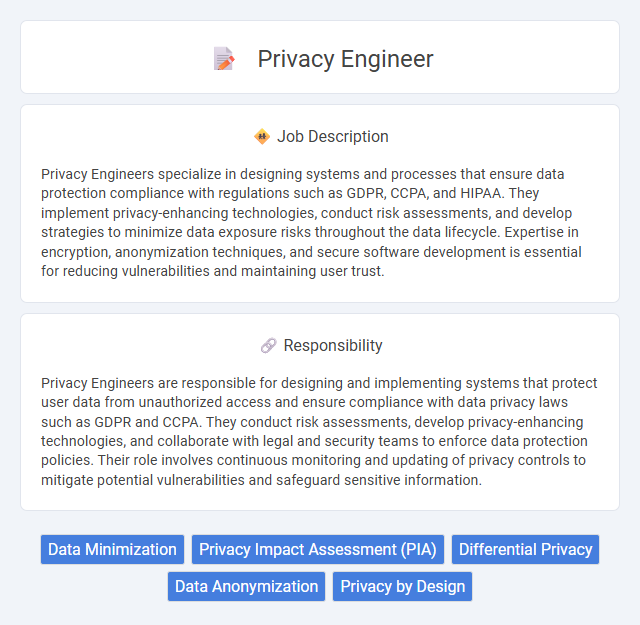
Privacy Engineers specialize in designing systems and processes that ensure data protection compliance with regulations such as GDPR, CCPA, and HIPAA. They implement privacy-enhancing technologies, conduct risk assessments, and develop strategies to minimize data exposure risks throughout the data lifecycle. Expertise in encryption, anonymization techniques, and secure software development is essential for reducing vulnerabilities and maintaining user trust.
Individuals with strong analytical skills and a passion for data protection are likely well-suited for a Privacy Engineer role, as it requires meticulous attention to detail and a solid understanding of regulatory compliance. Those who thrive in dynamic environments and can navigate complex legal frameworks probably find this job fulfilling and manageable. Conversely, people who dislike multitasking or lack interest in cybersecurity principles may struggle to succeed in this position.
Qualification
A Privacy Engineer requires expertise in data protection laws such as GDPR, CCPA, and HIPAA, combined with strong skills in software development and security architecture. Proficiency in risk assessment, cryptography, and privacy-preserving technologies like differential privacy or homomorphic encryption is essential. Experience with privacy impact assessments, data anonymization techniques, and cross-functional collaboration ensures effective implementation of privacy-by-design principles.
Responsibility
Privacy Engineers are responsible for designing and implementing systems that protect user data from unauthorized access and ensure compliance with data privacy laws such as GDPR and CCPA. They conduct risk assessments, develop privacy-enhancing technologies, and collaborate with legal and security teams to enforce data protection policies. Their role involves continuous monitoring and updating of privacy controls to mitigate potential vulnerabilities and safeguard sensitive information.
Benefit
Privacy Engineer roles likely offer significant benefits such as enhanced data security skills and valuable experience with compliance frameworks. Professionals in this field may enjoy increased job stability due to growing regulatory demands and rising awareness of privacy concerns. Opportunities for career advancement could be strong as organizations prioritize privacy engineering expertise to protect sensitive information.
Challenge
Privacy Engineer roles likely involve tackling complex challenges related to data protection and regulatory compliance. Ensuring systems are designed with privacy by default may require innovative problem-solving to balance usability and security. The probability of encountering evolving privacy laws suggests a need for continuous learning and adaptation in this dynamic field.
Career Advancement
Privacy Engineers design and implement systems that protect user data, ensuring compliance with regulations such as GDPR and CCPA. Career advancement in this field often involves mastering data security frameworks, gaining expertise in privacy laws, and developing skills in risk assessment and mitigation strategies. Progression can lead to roles like Senior Privacy Engineer, Privacy Architect, or Chief Privacy Officer, offering increased responsibility and leadership opportunities in privacy program development.
Key Terms
Data Minimization
Privacy Engineers implement data minimization strategies to reduce the collection and storage of unnecessary personal information, limiting exposure to data breaches and compliance risks. Their role involves designing systems that enforce strict data retention policies and anonymize data sets to protect user privacy without compromising functionality. Expertise in regulatory frameworks such as GDPR and CCPA is essential to ensure that data minimization practices meet legal requirements.
Privacy Impact Assessment (PIA)
Privacy Engineers play a crucial role in conducting Privacy Impact Assessments (PIAs) to identify and mitigate potential privacy risks in technology systems and data processing activities. They analyze data flows, evaluate compliance with regulations like GDPR and CCPA, and recommend design changes to minimize data exposure and enhance user privacy. Expertise in risk assessment tools and privacy frameworks enables Privacy Engineers to ensure that privacy considerations are integrated early in product development and throughout the data lifecycle.
Differential Privacy
Privacy Engineers specializing in Differential Privacy design and implement algorithms that ensure individual data remains indistinguishable within large datasets, safeguarding user information against re-identification attacks. They apply mathematical frameworks to add calibrated noise to data outputs, enabling the extraction of insights without compromising privacy or utility. Expertise in privacy-preserving technologies, cryptography, and data security regulations is essential to develop scalable and compliant privacy solutions.
Data Anonymization
Privacy Engineers specialize in implementing data anonymization techniques to protect sensitive information while maintaining data utility for analysis. They design and deploy methods such as k-anonymity, differential privacy, and data masking to prevent re-identification risks in datasets. Expertise in regulatory compliance frameworks like GDPR and CCPA ensures that anonymization processes meet legal standards and safeguard user privacy effectively.
Privacy by Design
Privacy Engineers specialize in integrating Privacy by Design principles into software development to ensure data protection from the outset. They collaborate with cross-functional teams to implement technical controls and conduct privacy risk assessments while maintaining compliance with regulations such as GDPR and CCPA. Expertise in encryption, anonymization, and secure coding practices enables them to embed privacy into system architecture effectively.
 kuljobs.com
kuljobs.com